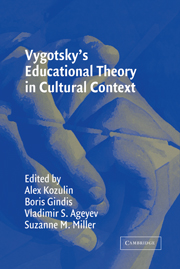Book contents
- Frontmatter
- Contents
- List of Contributors
- Series Foreword
- Introduction: Sociocultural Theory and Education: Students, Teachers, and Knowledge
- PART I CONCEPTS AND PARADIGMS
- PART II DEVELOPMENT AND LEARNING
- PART III SOCIOCULTURAL THEORY APPLICATION IN THE CLASSROOM
- 11 Cultural–Historical Theory and Mathematics Education
- 12 Sociocultural Theory and the Practice of Teaching Historical Concepts
- 13 Formation of Learning Activity and Theoretical Thinking in Science Teaching
- 14 How Literature Discussion Shapes Thinking
- 15 Beyond Cognition
- PART IV DIVERSE LEARNERS AND CONTEXTS OF EDUCATION
- Author Index
- Subject Index
- Titles in the series
- References
12 - Sociocultural Theory and the Practice of Teaching Historical Concepts
Published online by Cambridge University Press: 05 June 2012
- Frontmatter
- Contents
- List of Contributors
- Series Foreword
- Introduction: Sociocultural Theory and Education: Students, Teachers, and Knowledge
- PART I CONCEPTS AND PARADIGMS
- PART II DEVELOPMENT AND LEARNING
- PART III SOCIOCULTURAL THEORY APPLICATION IN THE CLASSROOM
- 11 Cultural–Historical Theory and Mathematics Education
- 12 Sociocultural Theory and the Practice of Teaching Historical Concepts
- 13 Formation of Learning Activity and Theoretical Thinking in Science Teaching
- 14 How Literature Discussion Shapes Thinking
- 15 Beyond Cognition
- PART IV DIVERSE LEARNERS AND CONTEXTS OF EDUCATION
- Author Index
- Subject Index
- Titles in the series
- References
Summary
Learning awakens a variety of internal developmental processes that are able to operate only when the child is interacting with people in his environment and in cooperation with peers.
(Vygotsky, 1978, p. 90)In our teacher education courses, we discuss with the trainee teachers educationally relevant topics from the field of learning theory. One of these topics is the acquisition of historical concepts. Through practical experiences and classroom assignments, the trainee teachers become aware of some of the problems involved in the teaching of concepts. Often, they plan to teach concepts in a straightforward matter-of-fact manner using a transmission model of teaching. As teacher educators, we challenge this idea in order to replace this approach with more effective models. So, with our trainee teachers we discuss how secondary education students can achieve a deeper understanding of concepts. Two basic elements of helping trainee teachers teach for understanding are (1) methods to create powerful learning environments and (2) methods to present the historical subject matter in terms of a meaningful whole.
This approach is influenced by a Vygotskian sociocultural theory of teaching and learning. In this perspective the creation of a learning environment can be conceived of as a shared problem space, inviting the students to participate in a process of negotiation and co-construction of knowledge. Lev Vygotsky, the founder of the sociocultural theory, developed a new framework for conceptualizing these educational dialogues, through which students acquire new modes of handling knowledge and solving problems.
- Type
- Chapter
- Information
- Vygotsky's Educational Theory in Cultural Context , pp. 246 - 266Publisher: Cambridge University PressPrint publication year: 2003
References
- 13
- Cited by



